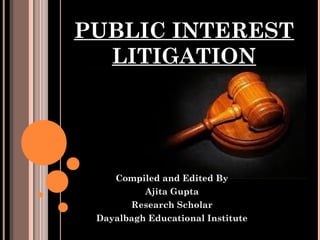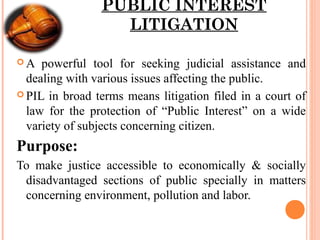Public Interest Litigation
- 1. PUBLIC INTEREST LITIGATION Compiled and Edited By Ajita Gupta Research Scholar Dayalbagh Educational Institute
- 2. PUBLIC INTEREST LITIGATION  A powerful tool for seeking judicial assistance and dealing with various issues affecting the public.  PIL in broad terms means litigation filed in a court of law for the protection of “Public Interest” on a wide variety of subjects concerning citizen. Purpose: To make justice accessible to economically & socially disadvantaged sections of public specially in matters concerning environment, pollution and labor.
- 3. IMPORTANCE OF PUBLIC INTEREST LITIGATION • It gives a wider description to the right to equality, life and personality which is guaranteed under part III of the Constitution of India. • It has introduced some kinds of reliefs or remedies under the writ jurisdiction. • It also functions as an effective instrument for changes in the society or social welfare. • Through PIL, any public or person can seek remedy on behalf of the oppressed class by introducing a PIL.
- 4. WHO CAN FILE A PIL • Member of public acting bona fide and having sufficient interest in instituting an action for redressal of public wrong or public injury. • He is not a mere busy body or a meddlesome interloper. • His action is not motivated by personal gain or any other oblique consideration. AGAINST WHOM PIL CAN BE FILED People can file a PIL against: Indian Government State Pollution Control Board Also against Private Factory (But PIL can Not file against only private party without concerning state govt. or central govt.
- 5. WHEN CAN A PIL BE FILED:  Where a factory / industrial unit is causing air pollution, & people nearby are getting effected.  Where in area/street there are no streetlights causing inconvenience to commuters.  Where some “Banquet Hall” plays a loud music in night causing noise pollution.  For abolishing child labor.
- 6. Cont.….. Where some construction company is cutting down trees, causing environmental pollution. Where rights of working women are affected by sexual harassment. For maintaining Roads, Sewer etc. in good condition. Where poor people are affected because of State Govt.’s arbitrary decisions to impose heavy “tax”. For removal of Big Hoarding & signboards from the busy road to avoid traffic problem.
- 7. WHERE A PIL CAN BE FILED • PIL is Just like a writ petition which is file in high court and supreme court under the article 226 for High court and article 32 for Supreme court. Some possible areas where PIL can be filed : • Violation of basic human rights of the poor • Content or conduct of Government Policy • Compel municipal authorities to perform a public duty • Violation of religious rights or other fundamental rights Court Fees: A Court fee of RS. 50, per respondent has to be affixed on the petition.
- 8. PROCEDURE TO FILE A PIL • Two copies of the petition have to be filed. • Also, an advance copy of petition has to be served on the each respondent, i.e. opposite party, and this proof of service has to be affixed on the petition.  Five sets o petition has to be filed opposite party is served, the copy only when notice is issued. High Court Supreme Court • Proceeding, in the PIL commence and carry on in the same manner, as other cases. • However, in between the proceedings if judge feels he my appoint a commissioner, to inspect allegations like pollution being caused, tree being cut, sewer problems etc. • After filing of replies, by opposite party and rejoinder by the petitioner, final hearing takes place and judge gives final decision.
- 9. RELIEFS AVAILABLE BY PIL Interim Measures The court can afford an early interim measure to protect the public interest till the final order. Appointing A Committee The court may appoint a committee or commissioner to look into the matter. Final Orders The court may also give final orders by way of direction to comply within a stipulated time.
- 10. THANK YOU










